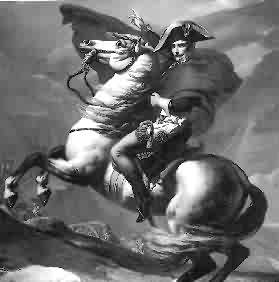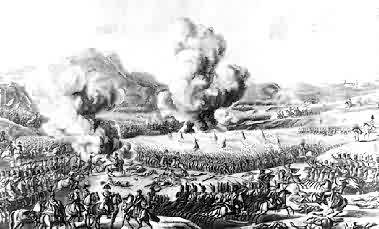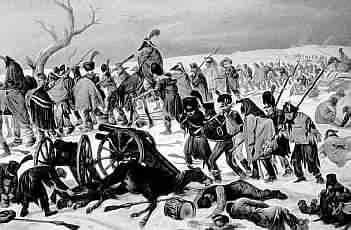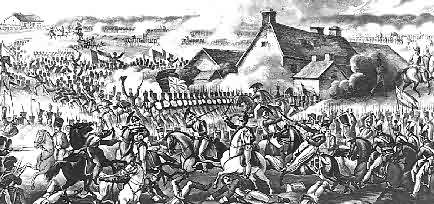
MARCH OF THE TITANS - A HISTORY OF THE WHITE RACE
CHAPTER 27 : NAPOLEON BONAPARTE - FRENCH DISSOLUTION
White history has very often been shaped by the intelligence, character, strength of will of a single individual. Examples include the first Egyptian king, Menes - Alexander the Great - Julius Caesar - Adolf Hitler and Napoleon Bonaparte.
Napoleon Bonaparte ranks with the giants of White history. His appearance on the European landscape changed not only the course of modern Western Europe but also impacted heavily upon France itself.

Napoleon Bonaparte, a Nordic racial type, born on the island of Sardinia in the Mediterranean.
NAPOLEON - FRANCE'S MOST FAMOUS ITALIAN
Although regarded as the typical Frenchman, Napoleon was in fact Italian - Genose to be exact. His father, Carlo Buonaparte, was an Corsican nobleman who had taken part in a Corsican uprising against the Genoans. Unable to quell the uprising, the Genoans sold the island to France only 15 months before Napoleon was born. To his last days, whenever Napoleon was angry, he would lapse into his native Corsican.
When the French took possession of the island, Carlo Buonaparte became a loyal French supporter - and the French King, Louis XV, rewarded the loyal Corsican nobility by granting them financial aid. This enabled Carlo to send his son Napoleon to a school in Autun, France, to improve his French in 1779. Later the same year, Napoleon then entered a French military school, and gained a commission as a lieutenant in the French army.
Recognized by his commanding officers as a soldier of exceptional ability, he was, by the time of the French revolution, a general who had worked his way up through the ranks by merit.
The wars which have become known as the Napoleonic Wars were essentially a continuation of the wars resulting from the Revolution, through which the Habsburgs of Austria and other royal houses in Europe combined in an effort to overthrow the revolutionary government of France and restore the French monarchy.
The wars which have become known as the Napoleonic Wars were essentially a continuation of the wars resulting from the Revolution, through which the Habsburgs of Austria and other royal houses in Europe combined in an effort to overthrow the revolutionary government of France and restore the French monarchy.

In the path of Hannibal - Napoleon crossing the Alps to do battle in northern Italy, against the First Coalition, 1799.
FIRST COALITION
In the War of the First Coalition, fought from 1793 to 1797, France fought against an alliance consisting of Austria, Prussia, Great Britain, Spain, the Netherlands, and the Kingdom of Sardinia.
In 1796, Napoleon was appointed in charge of conducting the war against Austrian forces in northern Italy. In less than a year, Napoleon had led his troops to victory over the larger Austrian army.
In 1798, Napoleon was entrusted with an expedition sent to conquer Egypt for use as a base to attack the British possession of India. The invasion was unsuccessful, and Napoleon returned to France. (It was at this time that the French troops discovered the Rosetta Stone, which led to the Egyptian writing of hieroglyphics being deciphered).
Although the Austrian and Egyptian campaigns took place before Napoleon took power in France, they are regarded as the first of the Napoleonic Wars.
SECOND COALITION - RUSSIA PULLS OUT AFTER REVERSES
A Second Coalition, consisting of Russia, Great Britain, Austria, the kingdom of Naples, Portugal and the Ottoman Empire was formed to fight France in December 1798.
The principal fighting of the War of the Second Coalition took place in Northern Italy and Switzerland during 1799. The Austrians and Russians defeated French forces in northern Italy (Napoleon was in Egypt at this time) and captured Milan (putting an end to a French inspired republic established there in 1797) and Turin.
The French fared better in Switzerland. After an initial Austrian victory in Zurich, French forces defeated a Russian army and destroyed a new Russian army sent as reinforcements. The new Russian army was forced to take refuge in the mountains of Grisons, where it was devastated by cold and starvation. This was enough for the Russians, who, complaining of a lack of Austrian co-operation, withdrew from the Second Coalition in October 1799.
THE AUSTRIAN CAMPAIGN
Upon his return to France Napoleon drew up a new army of 40,000 men and in 1800 crossed the Alps and attacked the Austrians, defeating them at the Battle of Marengo in June 1800. Simultaneously another French army crossed the Rhine and captured the city of Munich, pushing on to capture Linz in Austria.
Faced with these catastrophic defeats, the Austrians surrendered. In terms of the January 1801 Treaty of Luneville, Austria and its German allies ceded the left bank of the Rhine River to France, recognized the Batavian (Netherlands); Helvetian (Switzerland) , Cisalpine, and Ligurian (Italian) republics.
THE THIRD COALITION - BATTLE OF AUSTERLITZ
The defeat of the Austrians meant that only Britain remained at war with France. After an unsuccessful expedition into the recently declared Dutch republic of Batavia in 1799, they too made peace with France with the Treaty of Amiens in 1802.
This peace was however only a truce. A dispute over the sovereignty of the island of Malta flared up into a new war in 1803. In 1805, Britain was joined in its new war by Austria, Russia and Sweden, into what became known as the Third Coalition.
This time however France attracted a number of allies - Spain and the German states of Bavaria, Wurttemberg, and Baden all formally declared themselves on France's side.
Napoleon moved against Austria first, defeating them at Ulm, marching along the Danube River and capturing Vienna itself. Russian armies reinforced the Austrians, but Napoleon crushed the combined Austro-Russian forces in the Battle of Austerlitz in December 1805. Austria again capitulated, signing the Treaty of Pressburg in that same month, ceding to France territory in northern Italy and to Bavaria of territory in Austria itself. In addition, Austria recognized the duchies of Wurttemberg and Baden as independent kingdoms.

The 'Battle of the Three Emperors' - Austerlitz, 2 December 1805. This contemporary engraving of the famous battle gives an excellent idea of the scale of the battle which saw the French under Napoleon rout a combined Austro-Russian army in a day long battle.
KEEPING IT IN THE FAMILY
In Italy, Napoleon made his elder brother, Joseph Bonaparte, king of Naples in 1806. He made his third brother, Louis Bonaparte, king of Holland (the former Batavian Republic); and on July 12, he established the Confederation of the Rhine, which eventually consisted of all the states of Germany except Austria, Prussia, Brunswick, and Hessen. The formation of the Confederation put an end to the Holy Roman Empire and brought most of Germany under Napoleon's control.

Napoleon crowning his wife, Josephine, at their joint coronation as Emperor and Empress of France.
BATTLE OF TRAFALGAR - NAPOLEON LOSES HIS NAVY
Although utterly victorious on land, Napoleon's navy was crushed by the superior English navy at the October 1805 battle off Cape Trafalgar, where the English Admiral Horatio Nelson defeated a combined French and Spanish fleet, although Nelson himself was killed at the height of the battle.
ECONOMIC BLOCKADE
Deprived of the ability to launch a seaborne invasion, Napoleon then in 1806 started what became known as the Continental System, forbidding British trade with all European nations. Great Britain retaliated with the Orders of Council, which in effect prohibited neutrals from trading between the ports of any nations obeying Napoleon's decrees. British mastery of the sea made it difficult for Napoleon to enforce the Continental System and resulted eventually in the failure of his economic policy for Europe.
FOURTH COALITION
In 1806, Prussia, aroused by Napoleon's growing strength in Germany, joined in a Fourth Coalition with Great Britain, Russia, and Sweden. Napoleon crushed a Prussian army at the October 1806 Battle of Jena and followed this up by capturing Berlin itself.
Turning on the Russians, Napoleon then defeated the a Russian army in the Battle of Friedland, forcing them to make peace by the Treaty of Tilsit. In terms of this treaty Russia gave up its Polish possessions and became an ally of France. Prussia was deprived of half its territory and crippled by heavy indemnity payments and severe restrictions on the size of its standing army.
THE SPANISH ULCER
By 1808, Napoleon was master of all Europe except Russia and Great Britain. However, the rise of European nationalism - which he himself had helped to generate by the creation of the states which he established through his wars - were to ultimately prove his downfall.
The first outbreak of this nationalism occurred in Spain. In 1808, after dethroning King Charles IV of Spain, Napoleon made his brother Joseph Bonaparte king of the country. The Spanish however, rose up and drove Joseph out of Madrid. A war between the French and the Spanish then took place, known as the Peninsular War (fought from 1808 to 1814) which saw English troops land on the Iberian mainland.
The French were eventually defeated, suffering huge losses which severely dented the size of Napoleon's army in other theaters.
THE FIFTH COALITION
The British, safe from Napoleon's armies because of their mastery of the sea, organized yet another alliance against France, known as the Fifth Coalition. The first result of this coalition was a war with Austria. In July 1809 Napoleon was forced to put down an Austrian army at the battle of Wagram and settled the war with the Treaty of Vienna, in terms of which Austria lost Salzburg, part of Galicia, and a large part of its southern European territory.
Napoleon also divorced his first wife, Josephine, and married the daughter of Francis II of Austria in the vain hope of keeping Austria out of further coalitions against him.
DISASTER: THE CAMPAIGN IN RUSSIA
In 1812, war again broke out between France and Russia because of the Russian refusal to enforce the Continental System. With one large army already tied down by the "Spanish ulcer," Napoleon invaded Russia with an army of 422,000 men.
The Russians were defeated at Borodino and the French army marched into Moscow on 14 September 1812, suffering frightful losses along the way - of the original army of 422,000, only 100,000 men were left to occupy Moscow.
The Russians had however burned the city, making it impossible for Napoleon's troops to establish winter quarters there. Forced to retreat in temperatures dropping to -30 degrees below zero, the French army was destroyed, with a shattered 10,000 men reaching their jumping off point at the end of the campaign.
Losing 412,000 men during the campaign for no gain whatsoever had severe consequences for not only Napoleon, but France as well. By the end of the Napoleonic Wars, France had lost approximately one million men, severely diminishing the population as a whole.

Napoleon's defeat in Russia: only 10,000 out of 422,000 French soldiers survived the campaign. Here Napoleon and his troops retreat under freezing conditions.
DEFEAT - BATTLE OF LEIPZIG
Sensing that Napoleon had badly overplayed his hand, the Fifth Coalition drew up its forces - Russia, Prussia and Sweden then joined the Fifth Coalition.
In 1813, Prussia renewed hostilities against Napoleon, who, despite his army being weakened, managed to pull off the last military victory of his career, defeating the Prussians at the Battle of Dresden in August 1813. Here, Napoleon's last great army, scraped together from France's last reserves and consisting of some 100,000 men (a quarter of the size of his army at the beginning of the Russian campaign) defeated a combined Austrian, Prussian, and Russian force of about 150,000. The overwhelming numbers of the enemy combined with Napoleon's shrinking capacity however could not hold off the inevitable - in October 1814, he was defeated at the Battle of Leipzig and forced to leave all of Germany.
In 1814, France itself was invaded, and in March of that year a combined Russian, Austrian and Prussian force took Paris. Napoleon abdicated and was exiled to the island of Elba in the Mediterranean Sea.
WATERLOO - WELLINGTON'S HIRED ARMY DEFEATS NAPOLEON
While the victors of the Fifth Coalition assembled at the Congress of Vienna to restore the monarchies Napoleon had overthrown, Napoleon escaped from Elba and landed in France, where, despite the defeats he had suffered and the staggering population losses his wars had caused, he was welcomed back.
Through the sheer power of his personality he raised yet another French army and marched into Belgium to do battle with the stunned British, Prussians, Russians and Austrians.
Initially, Napoleon defeated the combined allied armies at the Battle of Ligny, but was then defeated twice in succession at Quatre-Bras and then in June 1815 at the famous Battle of Waterloo. Captured, Napoleon was exiled to the island of St. Helena in the South Atlantic where he died in 1821, most likely as a result of poisoning.

The Battle of Waterloo, 1815. Anglo-centric histories portray the final defeat of Napoleon as an English victory. In fact approximately 20,000 of General Arthur Wellington's army of 44,000 men were German mercenaries, excluding the 70,000 strong Prussian army under Marshall Blucher, who also fought at the momentous battle.
VENERATED REBURIAL IN 1840
Napoleon's remains were however exhumed and returned to France in 1840. He was reburied in the Les Invalides in Paris, a setting which must be one of the most lavish tombs in all Europe.
Napoleon's tomb continues to be a major focus of adulation and is, along with other Parisian landmarks, one of the biggest tourist attractions in Paris.
HIS LEGACY
The legacy left by Napoleon for Europe was considerable. The direct result of his wars that the nation of the Netherlands came into existence, as well as a number of German and Italian states, as well as Switzerland.
Napoleon was not only a military genius, but also a statesman of considerable ability. In France the state administration was reorganized, the court system was simplified, and all schools were put under centralized control. French law was standardized in the Code Napoleon and six other codes, guaranteeing equality before the law and freedom of religion.
Napoleon's own personal goal for Europe was to found a single European state like the United States of America, what he called a "federation of free peoples."
In all the lands occupied by Napoleon, the Code Napoleon was established as law. Feudalism and serfdom were abolished. Each state had a constitution with universal male suffrage and a parliament containing a bill of rights. French-style administrative and judicial systems were required.
Schools were put under centralized administration, and free public schools were envisioned. Higher education was opened to all who qualified, regardless of class or religion. Every state had an academy or institute for the promotion of the arts and sciences. Incomes were provided for eminent scholars, especially scientists.
However, his greatest legacy to France was a severe depopulation and reduction in the numbers of Whites in that country due to the losses inflicted during the wars. Because of the exponential nature of 19th Century European population demographics, the loss of a million Frenchmen in their prime seriously retarded France in the world population stakes.
or back to
or
All material (c) copyright Ostara Publications, 1999.
Re-use for commercial purposes strictly forbidden.